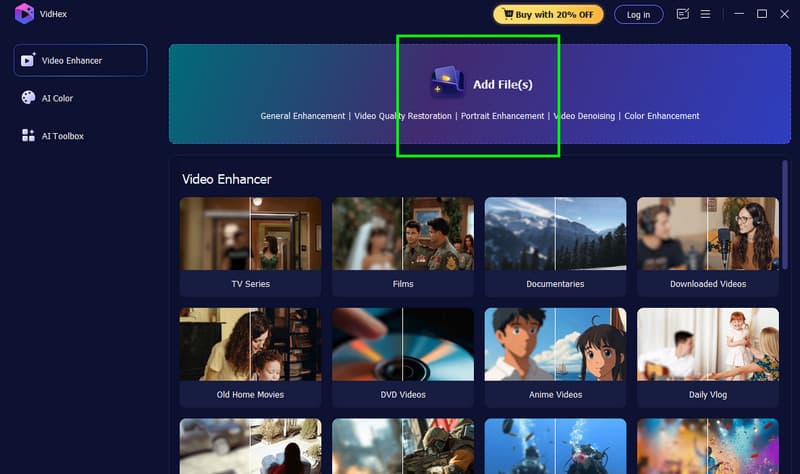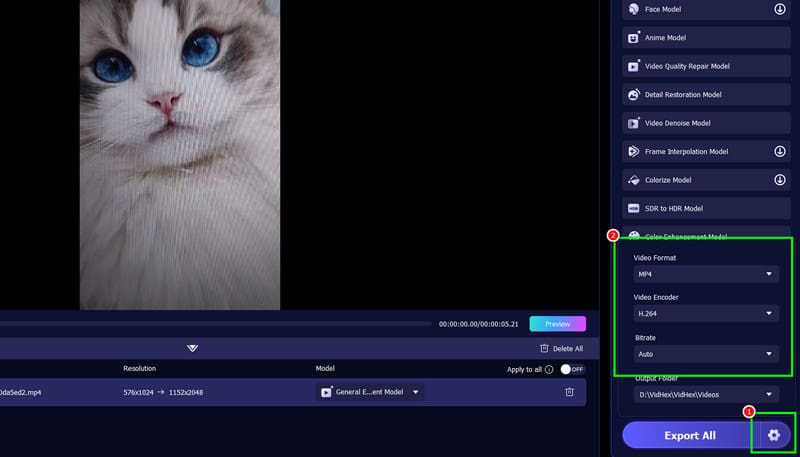2K Video Resolution: Everything You Need to Know [Explained]
What is 2K video resolution? Well, in this modern era, where digital media is evolving, various resolutions are showing up. Some of them are 720p, 1080p, HD, and more. But if you want a better resolution for watching videos, you might use 2K resolution. This way, you can watch your favorite footage smoothly and satisfyingly. Are you interested in getting more insights about the resolution? If so, you have to read this review. We are here to give you all the information you need about 2K video resolution, including its features, advantages, drawbacks, and more. You will also learn about the difference between 4K resolution. Thus, to start learning everything about the topic, read this post instantly.

PAGE CONTENT
Part 1. What is 2K Video Resolution
2K film resolution is a high-definition digital video format. It typically refers to a horizontal resolution of approximately 2,000 pixels. The most common and standardized specification for 2K is 2048 × 1080 pixels, which was established by the Digital Cinema Initiatives (DCI) for theatrical film projection. In this standard, the '2K' name comes from the horizontal pixel count of 2048, while the vertical resolution is 1080 pixels. This results in a wider aspect ratio of about 1.90:1 compared to the more common 16:9 format used in consumer displays.
The resolution's main goal is to provide viewers with a better viewing experience, enabling them to see a sharper video during playback. It is even better than some old resolutions, such as 720p and 1080p
Features of 2K Video Resolution
High Pixel Count and Sharpness
What makes the 2K resolution better is that it can offer a sharper and clearer image than 720p (HD). Having a higher pixel count means you can have more detailed output, making it excellent for tasks such as watching movies, documentaries, and playing video games. Thus, for a better experience, using 2K video resolution is ideal.
Wide Screen
The resolution can offer a wider screen for up to a 16:9 aspect ratio. With this good feature, you can watch videos on various platforms, such as televisions, monitors, and YouTube. It only means that it can show you all the content on the screen, without any black bars from the edges. So, for a better and immersive viewing experience, 2K would be a nice choice.
Compatibility and Performance
One of the core features of the resolution is its universal support. From smartphones, monitors, consoles, to media players, you can deal with 2k videos seamlessly. It even requires less processing power and storage space than 4K, making it easier to edit, store, and stream.
Balanced Quality for Streaming
When it comes to online video platforms, 2K strikes a better balance between high visual quality and file size. You can stream videos smoothly on your internet and use less data than 4K videos, making it a more practical and efficient option for both viewers and content creators.
Advantages of 2K Video Resolution
• 2K resolution is a long-established standard. In terms of compatibility, you can play the video on any platform. You can open 2K on every television, streaming service, game console, and more.
• Compared with 4K videos, the 2K video files contain a smaller file size, which is more ideal for preservation purposes. You can even collect more videos and store them on your hard drive without encountering any issues.
• Editing 2K is perfect since it is less demanding on a computer's processor, RAM, and graphics card.
• It can offer a sharp result, leading to a satisfying viewing experience.
Drawbacks of 2K Video Resolution
• It is less detailed compared with other resolutions, like 4K and 8k resolutions. The details will be noticeable when using a wider screen, like a 55-inch monitor.
• In video editing, 2k has limited cropping and reframing. It might affect the video resolution, making the output softer.
• Since there are various higher-resolution options available, 2K might become outdated sooner.
• Newer streaming platforms and monitors might not support the resolution anymore.
Common 2K Resolution Examples
After knowing what 2K video resolution is, maybe you want to see some examples. If so, check the table we have provided below.
| Name | Resolution | Aspect Ratio | Use Cases |
| DCI 2K (Full Frame) | 2048:1080 | close to 17:9 | Digital cinema projection |
| DCI 2K Scope | 2048:858 | ~2.39:1 | Widescreen cinema |
| DCI 2K Flat | 1998:1080 | 1.85:1 | Digital cinema projection |
| 2560:1080 (Ultra-Wide 1080p) | 2560:1080 | 21:9 | Budget ultra-wide monitors |
| UWQHD (Ultra-Wide QHD) | 3440:1440 | 21:9 | Ultra-wide monitors, gaming, and productivity. |
Part 2. Differences Between 2K and 4K Video Resolution
Want to see the difference between 2K quality to 4K? Well, 4K resolution typically has a common resolution of 3840 x 2160 pixels. It contains roughly four times the total number of pixels as 2K (1920 x 1080 pixels). This massive increase in pixel density means a 4K image can display far more fine detail, resulting in a dramatically sharper, more textured, and lifelike picture, especially on larger screens. You'll notice that individual elements, like strands of hair or leaves on a tree, are much more distinct, especially when playing them on your 4K video player.
This difference in sharpness comes with practical trade-offs. 4K video requires more storage space and internet bandwidth for streaming. In addition, it requires more powerful hardware for smooth editing and playback. Conversely, 2K resolution remains a highly versatile and efficient standard, offering excellent video quality with much smaller file sizes and lower processing demands, making it compatible with various devices.
For more insights, you can check the comparison table we have provided below.
| 2K Resolution | vs. | 4K Resolution |
| 1920 x 1080 = ~2.1 million pixels | Total Pixel Count | 3840 x 2160 = ~8.3 million pixels |
| Full HD, FHD, 1080p | Common Name | Ultra HD, UHD, 2160p |
| Sharp and clear, but less detailed. | Sharpness | Extremely detailed, crisp, and lifelike. |
| Smaller | File Size | Larger |
| Easier to edit | Editing | Requires a powerful computer. |
| Affordable | Cost | Expensive |
| Universal Standard | Media Availability | New Standard for the latest monitors and streaming platforms. |
Key Takeaways
• 4K has four times as many pixels compared with 2K, which is the root cause of all other differences.
• 2K display resolution is often used interchangeably with 1080p. On the other hand, 4K is the same as Ultra HD (UHD).
• 2K is far less demanding than 4K, making it more accessible for content creators and editors with standard hardware.
• 2K content is still more accessible, especially for older media.
Part 3. Common Devices that Support 2K Resolution
Various devices can deal with 2K resolutions. To learn some of them, see the information in this section.
Monitor and Displays
Nowadays, numerous monitors and displays can handle 2K video resolutions. You can play 2K videos on some high-end gaming monitors, such as Acer (Predator, Nitro), Dell (Alienware), ASUS (TUF and ROG series), and MSI brands.
Smartphones
Many smartphones can deal with 2K video resolutions. Some of the devices you can use are the Samsung Galaxy S series, the Google Pixel Pro series, the Sony Xperia 1 series, and more.
Other Devices
Devices like the Dell XPS 15 laptop and PlayStation 5 console support 2K resolution, as do certain security cameras, including the Reolink Argus, which can even record in 2K videos.
Part 4. Best Video Enhancer
Are you looking for the best video enhancer that can help you upscale your 1080, 2K, 4K, and 8K videos? In that case, you must access a program, like Vidmore Video Enhancer. With the help of this program, you can effectively and instantly enhance your videos. The best part here is that you can choose your desired resolution. You can enhance videos up to 100%, 200%, and even 400%. Additionally, you can also adjust various parameters during the process. You can change the bitrate, video encoder, and output format. You can save the video as MOV, MKV, MP4, and more. What we like most here is that you can navigate all the features smoothly because of its understandable user interface.
Furthermore, you can also enhance multiple videos at once. With its batch upscaling feature, you can improve all your videos while saving more time. Lastly, you can even upscale any type of video, including recording, movies, anime, daily vlogs, documentaries, and more. Thus, if you want the best video enhancer for Windows and Mac, look no further than Vidmore Video Enhancer.
Monitor and Displays
• The software can automatically correct the color in the video.
• It has a Video Denoiser feature that effectively reduces video noise.
• The program can fix shaky videos.
• It offers a straightforward user interface for simple navigation.
To start enhancing your videos, you can check the instructions below.
Step 1. Download Vidmore Video Enhancer on your computer. Launch it to begin the main process.
Step 2. Then, from the primary interface, click the Add File button to add/insert the video you want to upscale. You can add as many as you want since the software supports a batch upscaling feature.

Step 3. After you add the video, proceed to the Output Resolution option to enhance it. You can enhance your file up to 400% if you want to.

Step 4. Proceed to the Setting section to select your preferred output format, bitrate, and video encoder.

Step 5. Finally, hit the Export All button below to start saving the enhanced video on your computer.

Step 5. Now, you have learned how to enhance your videos, which can give you a better viewing experience. Thus, to get a better version of your footage, you can always rely on Vidmore, which is the best video resolution enhancer.
Part 5. FAQs about 2K Video Resolution
Can I convert 2K to 4K?
Absolutely, yes. There are various converters available that can help you turn your 2K to 4K. You can even use an amazing video upscaler to let you achieve your desired result.
Can I play 2K videos everywhere?
Definitely, yes. Since 2K is among the standard resolutions, there is no doubt that you can access it on various platforms, especially on those 2k-supported devices.
Which is better, 1080p or 2K?
Quality-wise, 2K is superior to 1080p due to its higher pixel count. In addition to that, you can get more details on 2K, allowing you to enjoy your videos during playback.
Conclusion
Thanks to this article, you have learned all the information about 2K video resolution. You even get to know more about its features, pros, cons, and its differences from 4K. In addition to that, if you are planning to enhance/upscale the resolution of your videos, you can access Vidmore Video Enhancer. This program is ideal since it can produce high-quality videos, leading to better playback.



